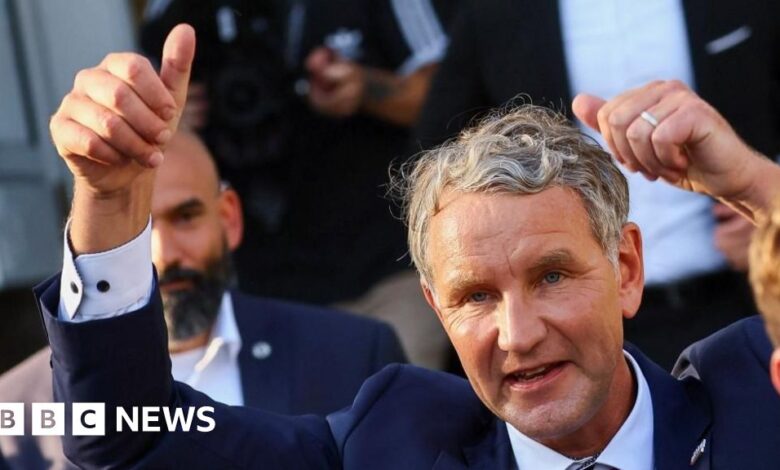German far-right eyes victory in east

Germany’s anti-immigration party Alternative for Germany is on track to win in the eastern state of Thuringia, according to predictions.
Public broadcaster ARD predicts the AfD will win 30.8% of the vote, six points ahead of the conservative CDU and well ahead of Germany’s three ruling parties.
If confirmed, this would give the far-right its first victory in a state parliamentary vote since World War II, although it is unlikely to form a government in Thuringia.
Around five million Germans are eligible to vote in two eastern state elections on Sunday. The AfD is also trailing the conservative CDU in the state parliamentary election in Saxony.
In Saxony, ARD’s forecast shows the CDU on 31.6% and the AfD on 30.4%, again ahead of the three parties running the national government.
The AfD’s leading candidate in Thuringia, Björn Höcke, a controversial figure in Germany, hailed it as a “historic victory”.
His party has been designated as far-right and he has been fined for using Nazi slogans, although the former history teacher denies doing so intentionally.
Nationally, the AfD is second in the polls and co-leader Alice Weidel said it was clear that voters in both eastern states wanted her party in power: “Without us, there would be no stable government.”
“Politicians have made a lot of promises, especially on migration and foreigners,” AfD voter Michael told the BBC in the Thuringia state capital Erfurt.
“But nothing happened. Nothing. Just promises from these parties. Now I have my party. And I stand by my decision.”
Immigration is a big issue in Sunday’s election, but the AfD also wants to stop arms supplies to Ukraine, as is a new party that is aiming for third place in both states, the BSW party of left-wing populist leader Sahra Wagenknecht.
Despite having similar ideas to the AfD on Ukraine, Ms Wagenknecht has refused to enter into any coalition with the party, leaving the far-right party with little chance of winning in Thuringia.
If the projections are confirmed, the AfD will win 30 seats in the 88-seat state parliament in Thuringia, and the CDU will win 24, leaving only one of the three parties represented in the national government.
Chancellor Olaf Scholz’s Social Democratic Party (SPD) won just seven seats, while the Greens and the liberal FDP did not win any.
With just a year to go until the federal election, Sunday’s vote underscored the unpopularity of Germany’s ruling “traffic light” coalition, so named because of its party colors of red, yellow and green.
The third eastern state, Brandenburg, goes to the polls in three weeks and although the AfD is leading in opinion polls, the Social Democrats and the conservatives are only a few points behind.




